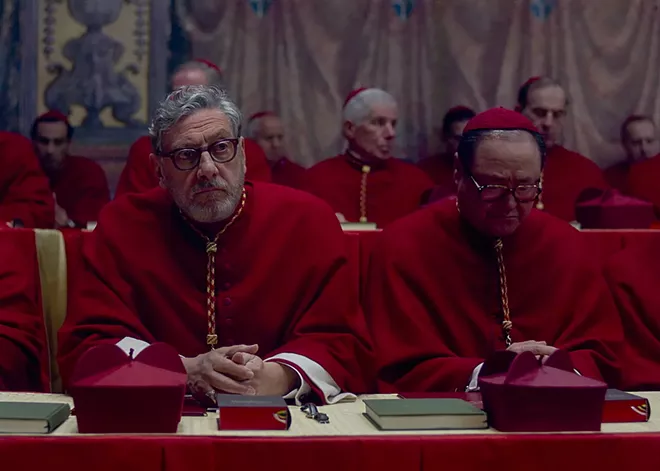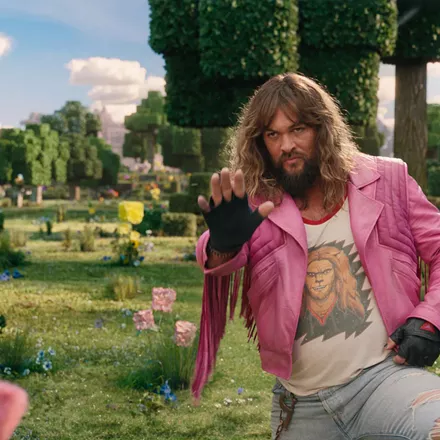According to doctrine, the first pope of the Catholic Church was handpicked by Jesus from his original twelve apostles. But what did the eleven others think of the choice? What if they'd had to decide it among themselves? Would they have done so with grace and humility or fallen prey to humanity's tendency toward hubris?
In Edward Berger's taut Conclave, this is the central point of tension as we get taken inside a chaotic papal election following the death of the former pope. Soon, it seems nearly everyone is looking to make a play at ascension while the future of an entire religion and a tumultuous world outside hangs in the balance. Trying to hold it together is Cardinal Lawrence, played by Ralph Fiennes (in a performance that rivals his very best work in great films like Grand Budapest and In Bruges), who is struggling with a crisis of faith, a surprise new cardinal, and the discovery that his compatriots carry secrets which may blow up the process.
The hook is a stellar one for both character-driven drama and a sprinkling of darkly humorous ribbing, as there is no electoral process with more mystique surrounding it than the papal one. The basics involve a group of cardinals gathering in a private meeting known as a conclave, cutting themselves off almost completely from any outside influences and voting by secret ballots. They then communicate the results via smoke signals — white smoke meaning a choice has been made and black meaning one has not. Yet Berger, who previously directed the painfully grim yet ruthlessly effective All Quiet on the Western Front adaptation from 2022, uses this pomp and circumstance to skewer the whole absurd affair just as the characters remain deathly serious. As we see various factions beginning to form around those like Stanley Tucci's Bellini and John Lithgow's Tremblay, it's clear the institution itself is at a turning point. There is the potential for a more progressive, inclusive church just as there is to a return to a regressive, judgmental one.
This is something Berger and writer Peter Straughan (adapting another novel, as he did for the terrific Tinker Tailor Soldier Spy) make into an explicitly contemporary political allegory. One conversation about having to essentially vote for the lesser of two evils to forestall disaster could refer to any number of modern elections. Still, it never takes you out of the film. Instead, it remains grounded in its own story as the crisis that the group is facing is not just one of religion but of personality, politics and power. Whoever is chosen could reshape the church and impact the lives of millions.
Every scene discussing this is meticulously captured with an eye for haunting compositions by the talented cinematographer Stéphane Fontaine (Jackie), who turns the simplest of scenes into ones that more closely resemble paintings. Forget the more grand sequences, how he stages a small shadowy meeting is just as striking. He makes the most of every confined space, ensuring the film feels vast in one scene and suffocating in another. It may be a film that telegraphs key revelations — making a closing twist seem almost inevitable by the end — but it's shot with such potent precision you can't help getting swept up in its machinations.
Through it all, Fiennes remains a mesmerizing screen presence who grounds the experience even as it gets more than a little pulpy. From the quiet scenes he shares with a scene-stealing Isabella Rossellini (who makes the most of a small yet absolutely critical part as the all-seeing Sister Agnes) to the louder ones where all the conflict comes to fore, he holds the camera with such confidence that you don't dare look away for even a second. While there is an explosive moment where Berger nearly loses a handle on the whole thing, just looking into the face of Fiennes as his lonely cardinal grapples with his faith is what gives Conclave its lasting punch. He brings life to a man who eternally struggles with belief and ponders what future, if any, he has in his church.
The last revelation the film hangs its enormous papal tiara on will warrant pages upon pages of reflections as it comes close to being misconceived or, even worse, contradictory to what it is going for with a closing monologue. Yet it serves as a fitting final upheaval that lands because of how sincerely it unfolds with the last shot feeling almost surprisingly tranquil. There are plenty of thrills to be found in witnessing the petty squabbles of men jostling for power. But as Berger reveals in decisive fashion, the ones most fit to hold power are also the ones who do not seek it. Otherwise, it's all too easy for the fragile systems of governance we all cling to go up in smoke. ♦
![]()
Conclave
Rated PG
Directed by Edward Berger
Starring Ralph Fiennes, Stanley Tucci, John Lithgow, Lucian Msamati, Isabella Rossellini

























